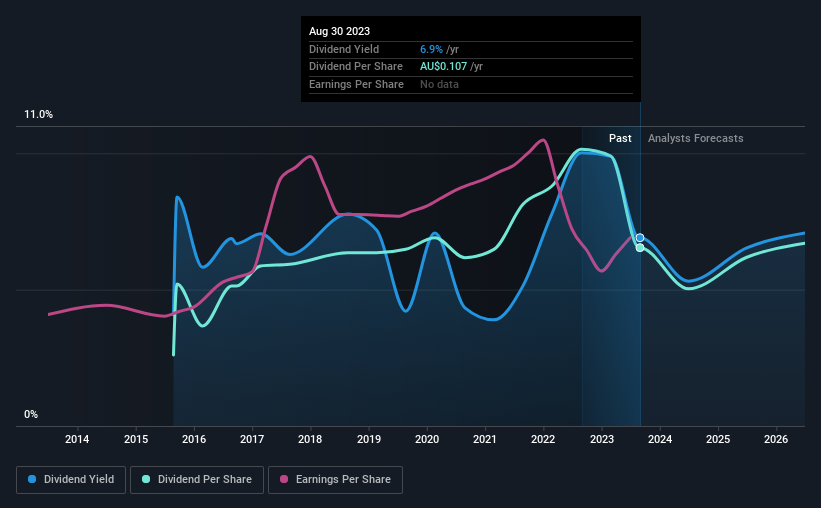Don't Buy Australian Finance Group Limited (ASX:AFG) For Its Next Dividend Without Doing These Checks
Readers hoping to buy Australian Finance Group Limited (ASX:AFG) for its dividend will need to make their move shortly, as the stock is about to trade ex-dividend. The ex-dividend date is usually set to be one business day before the record date which is the cut-off date on which you must be present on the company's books as a shareholder in order to receive the dividend. It is important to be aware of the ex-dividend date because any trade on the stock needs to have been settled on or before the record date. Thus, you can purchase Australian Finance Group's shares before the 4th of September in order to receive the dividend, which the company will pay on the 22nd of September.
The company's next dividend payment will be AU$0.041 per share. Last year, in total, the company distributed AU$0.11 to shareholders. Looking at the last 12 months of distributions, Australian Finance Group has a trailing yield of approximately 6.9% on its current stock price of A$1.55. If you buy this business for its dividend, you should have an idea of whether Australian Finance Group's dividend is reliable and sustainable. As a result, readers should always check whether Australian Finance Group has been able to grow its dividends, or if the dividend might be cut.
See our latest analysis for Australian Finance Group
Dividends are typically paid from company earnings. If a company pays more in dividends than it earned in profit, then the dividend could be unsustainable. Its dividend payout ratio is 77% of profit, which means the company is paying out a majority of its earnings. The relatively limited profit reinvestment could slow the rate of future earnings growth. We'd be worried about the risk of a drop in earnings.
Companies that pay out less in dividends than they earn in profits generally have more sustainable dividends. The lower the payout ratio, the more wiggle room the business has before it could be forced to cut the dividend.
Click here to see the company's payout ratio, plus analyst estimates of its future dividends.
Have Earnings And Dividends Been Growing?
When earnings decline, dividend companies become much harder to analyse and own safely. If earnings fall far enough, the company could be forced to cut its dividend. That's why it's not ideal to see Australian Finance Group's earnings per share have been shrinking at 2.3% a year over the previous five years.
The main way most investors will assess a company's dividend prospects is by checking the historical rate of dividend growth. In the last eight years, Australian Finance Group has lifted its dividend by approximately 12% a year on average. That's intriguing, but the combination of growing dividends despite declining earnings can typically only be achieved by paying out a larger percentage of profits. Australian Finance Group is already paying out 77% of its profits, and with shrinking earnings we think it's unlikely that this dividend will grow quickly in the future.
To Sum It Up
Has Australian Finance Group got what it takes to maintain its dividend payments? Earnings per share have been declining and the company is paying out more than half its profits to shareholders; not an enticing combination. This is not an overtly appealing combination of characteristics, and we're just not that interested in this company's dividend.
With that in mind though, if the poor dividend characteristics of Australian Finance Group don't faze you, it's worth being mindful of the risks involved with this business. To that end, you should learn about the 2 warning signs we've spotted with Australian Finance Group (including 1 which is significant).
Generally, we wouldn't recommend just buying the first dividend stock you see. Here's a curated list of interesting stocks that are strong dividend payers.
Have feedback on this article? Concerned about the content? Get in touch with us directly. Alternatively, email editorial-team (at) simplywallst.com.
This article by Simply Wall St is general in nature. We provide commentary based on historical data and analyst forecasts only using an unbiased methodology and our articles are not intended to be financial advice. It does not constitute a recommendation to buy or sell any stock, and does not take account of your objectives, or your financial situation. We aim to bring you long-term focused analysis driven by fundamental data. Note that our analysis may not factor in the latest price-sensitive company announcements or qualitative material. Simply Wall St has no position in any stocks mentioned.

